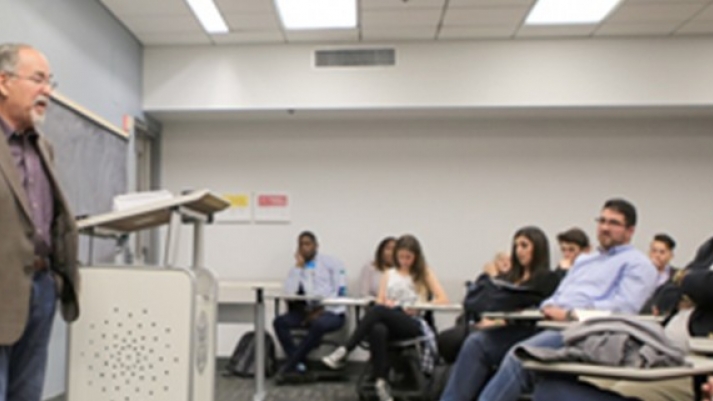Author David Horowitz spoke at a meeting of the USC College Republicans Wednesday evening in Taper Hall. Students protested the event due to his rhetoric, which some students consider inflammatory.
Horowitz, who founded the David Horowitz Freedom Center think tank, presented a talk called “Stop the Jew Hatred,” which aimed to educate attendees on anti-Semitism in America and the right of Israel to exert its influence in the Middle East. He also discussed what he saw as the widespread goal of Muslims to wage war against Jews, claiming that a large percentage of Muslims support jihadist acts of terror against the United States.
“[Muslim hatred of Jews] is very open,” Horowitz said. “The difference between Islamic fanatics, or Jew haters, and Hitler is that Hitler hid the Final Solution, and the Iranians and Hezbollah shout it from the rooftops.”
Horowitz explained that he believes Palestine has no right to its territory and that the conflict between Israel and Palestine is mainly due to Arab aggression against Jews. He defended earlier statements he had made about the inferiority of Palestinians and claimed that a two-state solution is not possible due to the inherent violence of the Islamic religion.
“The terrorists that blew up the airport in Brussels came from a Muslim neighborhood,” Horowitz said. “You think they didn’t know what was going on? Same with San Bernardino. The mosque is notorious for sponsoring terrorism.”
Prior to the presentation, a group of students gathered outside of Taper Hall to protest Horowitz’s invitation to speak on campus. Protesters held signs declaring that “anti-Zionism is not anti-Semitism” to state that Palestinians who are against Israel did not necessarily hate Jews. They also claimed that Horowitz’s rhetoric was inflammatory and racist, citing his statements that the keffiyeh kerchief worn as a headdress by many Palestinians was a symbol of terrorism as hate speech.
“I’m a Muslim living in America,” said Muhammad Yusuf Tarr, a freshman majoring in broadcast journalism who was protesting Horowitz’s talk. “I see how the people who are noticeably Muslim are treated. I know friends who are afraid of speaking Arabic.”
Horowitz responded to the protesters’ claims by defending his freedom of speech, stating that if students had any serious concerns, they would try to understand why. He also alleged that the attempt to shut down any speech seen as “conservative” reflected the growing global presence of jihadist movements, which silenced opposition in an attempt to grow their own power.
“[Terrorism] silences individual freedom to intimidate people,” Horowitz said. “This is a sinister movement. Why do they want to silence anyone who disagrees with them? That is the only way that they can sustain the [lies] that feed them.”
Tarr and others, however, believed that Horowitz went beyond exercising his First Amendment rights and actually harmed many of the students in attendance through inflammatory rhetoric.
“This is my University,” Tarr said. “He may have free speech, but I do too, and I don’t want him to come here to an educational institution and continue saying all of these things against many of the people who are here. There is a concept called hate speech, and I believe that he crosses the line when it comes to that.”
Several students in attendance agreed with Horowitz’s viewpoint on his right to speak on campus, although they may not see eye-to-eye with the way he presented his thoughts. Jordan Tygh, a graduate student studying liberal studies, explained that he thought labeling something “hate speech” could potentially be used as a way to silence people whose opinions were simply different from the majority.
“I didn’t agree with [Horowitz’s] tone, but I think that the idea of hate speech is dangerous,” Tygh said. “I can disagree with things that he says, and I have the highest respect for Muslim culture. But everyone should be allowed to speak because that way people can learn critical thinking.”
Horowitz previously spoke at USC in November 2009, an event that also drew criticism from student groups such as the Students for Justice in Palestine and the Muslim Student Union. In that event, protesters were escorted from the room by Department of Public Safety officers.
This article was originally published in the USC Daily Trojan
